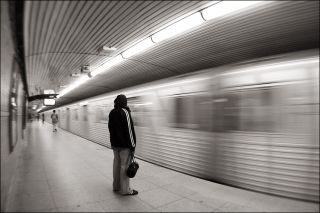Happiness
Serious Busyness
How we respond to idleness changes the way we feel and decide
Posted May 13, 2013

When I recently had to wait an inordinate amount of time for the elevator in my building (“It’s been 15 seconds! Why doesn’t someone fix this thing?!”), I instinctually grabbed for my phone and took care of some extremely important business (people depend on me to make my moves in Words With Friends). I then actually thought – and I’m not making this up – “Before smartphones existed, I wonder what people did when they waited for elevators?” To be fair, I can very clearly remember a time when I didn’t have a smartphone, and when standing around normally meant, well, standing around. Now, however, there are more and more things to distract us, and more and more ways to avoid being idle. Yet, a clever research paper recently suggested that although we hate idleness, we actually require reasons to be busy, which are not always easy to generate.
The paper, by Chris Hsee and colleagues, starts with the idea that people dread boredom. Hopefully that last sentence didn’t make you feel it. Maybe we don’t need research to tell us this, but studies have shown that no one likes to wait, work is considered a good thing, the more we labor at something the more we appreciate it, and people naturally tire of monotony. People would rather be doing something than doing nothing. To some degree, though, people are rational, and balk at the idea of filling their time just to simply fill their time. In other words, we like – and we need – to base our decisions on reasons. Without reasons for our decisions, it would feel as if we were living in a random and chaotic world, which is a downright scary thought.
So, we would prefer to be busy rather than idle, but we would also prefer to have a reason for engaging in some activity rather than just being busy for the sake of being busy. Hsee and colleagues set out to demonstrate these ideas in an interesting way. Participants were first told that they’d be filling out several surveys. After completing the first survey, they found out that the next survey wouldn’t be ready for another 15 minutes, and that they had to drop off their completed survey in the meantime. There were two places for them to do so: one was right around the corner, while the other was about a 12-15 minute walk away. The reward for dropping off the survey was a piece of chocolate. Now, here’s the catch. One group of participants was told that the chocolate that they would earn was the same in both locations. The other group, however, was told that there was one type of chocolate at the nearby location (dark chocolate) and a different type chocolate at the faraway location (milk chocolate)[1].
The way this study was set up, then, the people in the same-chocolate condition had no real reason to justify walking 12-15 minutes for the same piece of chocolate that they could get nearby. It would seem silly to walk almost 15 minutes for the same piece of chocolate that was just a few feet away. Yet, if they chose not to make that walk they would have to wait idly for 15 minutes while the second survey was being prepared. By contrast, the people in the different-chocolate condition had a natural reason to justify walking 15 minutes: the different piece of chocolate. Indeed, 60% of the participants in the different-chocolate condition chose to walk 15 minutes to the other location; in the same-chocolate condition, however, only 30% did so.
What’s really interesting, though, is that people who chose to walk 15 minutes reported greater happiness than the people who chose to sit around and wait. This is a real paradox: without a sufficient reason to be busy, people will choose to do nothing (which is what 70% of people in the same-chocolate condition did), but the people who choose to make themselves busy actually report greater happiness. Could it be that people simply mispredict how their choices would affect their happiness? To answer this question, Hsee and colleagues described their experiment to a separate group of people and asked them to predict whether walking or staying would result in greater happiness. The majority said that being busy (that is, walking) would lead to more happiness than remaining idle (that is, staying). So, people intuitively know that being busy will create happiness, but without a reason for being busy, they will choose to be idle.
In a follow-up study, Hsee and colleagues repeated the chocolate study with one key difference. Here, instead of asking people to choose whether to walk or to stay, the researchers forced one group to remain idle and forced the other group to travel the 15 minutes to the faraway location. Strikingly, the folks in the forced busyness condition ended up reporting greater happiness than those in the forced idleness condition. As the authors note, there are times when given a choice, people don’t necessarily choose in a way that maximizes their well-being (retirement choices and healthy eating decisions are just two examples). The people in these studies were no exception, and this raises an important point. If people are sometimes not that great at making decisions for themselves (as was shown here), then there is a role for setting up environments in a way that subtly guide people toward making optimal choices (or what’s known as libertarian paternalism).
Overall though, does this work suggest that people should never be idle? No, not necessarily. It’s important to note that being busy doesn’t always need to be equated with being active. Someone could appear to be sitting idly, for example, yet still be busy if they are deep in thought or meditating. What this work does imply is that giving yourself a reason to not be idle – really, any reason at all – will allow you to be “busy,” and ultimately more satisfied.
[1] Importantly, the experimenters randomly varied whether the milk chocolate was close by or the dark chocolate was close by, and a pre-test determined that these two chocolates were equally desirable.


